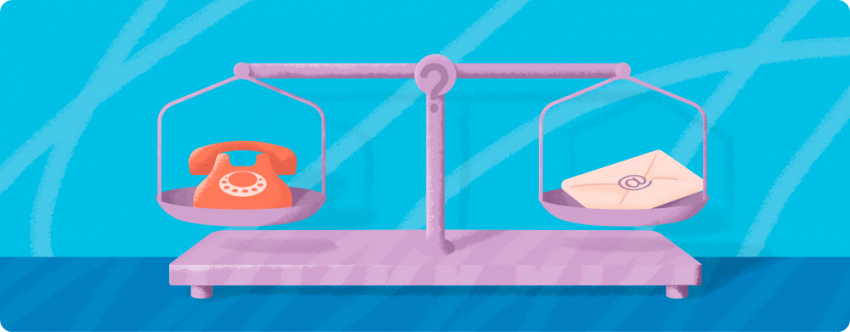Cold calling may seem as outdated as a dinosaur in a business suit, but guess what? It’s actually still the 2nd most successful option for driving B2B sales after referrals.🎉
Cold calling isn’t pushing up daisies just yet; it’s simply evolved. Today’s prospects and customers crave precise, time-effective pitches that offer a personalized touch rather than yawn-inducing, robotic, one-size-fits-all scripts.
In this article, we’ll discuss how you can leverage cold calling today to instantly boost your B2B sales success. But first, let’s make sure we’re all on the same page with the term ‘cold calling.’
Outline:
What is cold calling?

Cold calling is a sales practice where sales reps make unsolicited calls to potential leads in order to build relationships with them and convert them into future customers. It’s like a blind date for businesses.
Cold calling is all about forging meaningful connections with people who could benefit from your product or service. It demands a cocktail of research, planning, and practice, shaken with persistence and adaptability. When done well, it can be a powerful tool for driving sales and growing your business.
Cold calling fulfills the following purposes:
- Boosts your client base by reaching out to new customers like a friendly neighbor.
- Helps form personal connections with potential customers, one call at a time.
- Assists in obtaining valuable insights and tailoring your sales pitch like a perfectly fitted suit.
Cold calling vs. warm calling
Cold calling is one of the two primary methods for reaching out to potential clients by phone. The other contender? Warm calling.
So what’s the difference between cold calling and warm calling?
Cold calling involves reaching out to individuals or businesses without any prior relationship or introduction, whereas warm calling presupposes contacting prospects that have already shown some level of interest or familiarity with your company or its products.
Warm calling is generally considered the sleeker, more efficient sibling of cold calling. By focusing on warm leads, sales reps can invest more time in building relationships and offering personalized solutions to potential clients.
This results in warm leads having a significantly higher conversion rate than cold leads – a whopping 30% compared to just 1%. This highlights the importance of getting cozy with potential customers before making a sales pitch.
That doesn’t mean, however, that cold calling is a lost cause. It can be very effective in certain situations, like targeting a new market or industry. And let’s not forget that about 78% of decision-makers in companies have taken an appointment or attended an event that originated from an email or cold call. That’s a significant percentage that shouldn’t be ignored. 👏
Cold сalling vs. сold emailing

Cold calling and cold emailing are the dynamic duo of lead generation and sales in the B2B world. The difference is merely in the channel of communication: cold calling is all about dialing up potential customers, while cold emailing is more like sliding into their inboxes without an explicit invitation. Both methods have their own advantages and disadvantages.
Cold calling’s superpower is the ability to gather immediate feedback and build rapport with potential customers. It’s often easier to gauge someone’s interest and respond to their objections when you’re speaking to them directly. However, cold calling can also be a major time-drain and may feel intrusive to some prospects, putting them on the defensive.
On the other hand, cold emailing is less intrusive and allows for a more targeted approach. Companies can often reach a larger audience with cold emails and use automation tools to streamline the process. However, email responses may take longer than phone conversations, and there’s less opportunity to build a personal connection with potential customers.
So, what’s the final verdict?
Well, your company can actually harness the powers of both cold calling and cold emailing to generate sales leads. It’s all about considering your target audience and the specific goals of your outreach efforts when choosing which superhero to call upon.
Cold calling tips for B2B sales success
With the right approach, cold calling can be a powerful tool for B2B sales success. But how do you turn this chilly tactic into a warm connection?
In order to ace cold calling, it’s crucial to have a well-planned strategy and be prepared to handle objections and rejections like a pro. The following tips will help you turn your cold calling into a winning game.
Tip #1. Be purposeful with your sales pitch
Nobody has time for a sales rep that can’t stay on topic and keeps going on tangents like a lost traveler. Unfortunately, few people can remember every point they want to make in their pitch. But that’s where a trusty B2B sales script swoops in to save the day.
Your goal is to be quick and efficient with your words, treating your lead’s time like the precious commodity it is. Creating a script from scratch can be a daunting task, though. So, instead of racking your brain for days on end, why not use a Cold Call Script Template as your base and tailor it to your unique needs?
As your experience improves, you can develop a script based on customer feedback that suits your product perfectly.
|
Want to learn more about crafting the perfect sales pitch? Check out one of our recent posts. |
Tip #2. Personalize your interactions
When you make tens, if not hundreds, of cold calls daily, it’s easy to start seeing prospects as nothing more than phone numbers in an Excel sheet. However, people love to be treated as individuals and will notice if you don’t bother making them feel special.
To ensure you value prospects, think about how you’ll personalize your calls. Start by familiarizing yourself with their business and profession. Do your homework and research more on what your prospects like and struggle with. This will help you better understand their pain points, anticipate their objections, and eloquently explain your product’s benefits.
Tip #3. Be human first, sell later
Don’t rush into listing all the fantastic features of your product or service like an infomercial. Instead, focus your calls on your prospect – their feelings, likes, and expectations. Take the time to answer their questions, remove perceived barriers, and reassure them that you have their best interest at heart. You’re building a relationship, not just making a sale.
Tip #4. Prepare an impressive opening line
You may have the world’s most effective pitch, but if you fail to make a splash within the first few seconds of the call, chances are you’ll get hung up on. For example, opening with lines like “Did I catch you at a bad time?” is likely to reduce your chances of a meeting by 40% because it hands the prospect an easy exit strategy.
However, giving a precise reason for calling and asking how the prospect has been doing would increase your chances by 210% and 660%, respectively. So, whip up a catchy, effective opener to ensure you don’t break the deal at the start.

Tip #5. Use a local number to build trust
Many people automatically decline calls coming from foreign numbers – it’s like seeing an unfamiliar face at your front door. If you want to improve your chances of having a conversation with your prospect, consider using a local number. A local number goes a long way in building trust and accountability in the prospect’s mind.
Nowadays, this is easier than ever with VoIP software, which comes with an in-built virtual calling feature and a host of international phone numbers to choose from for convenient cold calling.
So go ahead, dial up that trust factor!
Tip #6. Build an effective sales cadence
No matter how great your pitch is, people will forget all about you if you don’t consistently follow up with them. It’s like watering a plant – you can’t just do it once and expect it to thrive!
It’s essential to have a structured workflow involving multi-channel touch points like emails, calls, SMS, and social media. For example, setting up an email sequence using cold email outreach tools is an excellent way to plan an effective communication cadence.
An effective sales cadence helps you maintain a harmonious rhythm between the various touchpoints, solidify the connection with your prospect, and accelerate the conversion process by ensuring that you can close more deals in less time.
Tip #7. Review & revise your call strategy regularly
Every customer has constantly evolving preferences, so there’s no such thing as a ‘perfect cold call.’ Cold calling is a process of continuous trial and error with no one-size-fits-all approach.
The most effective trick is to regularly review your calls by analyzing feedback and insights and continuously improve your call strategy to stay ahead of your competitors.
Embrace technology by using suitable software like Cloudtalk, which offers features like call tracking, business tool integration, and virtual calling to help streamline the cold calling process and fast-track the closing of your deals.
Tip #8. Always keep a close ready
If you’ve ever watched your sales pitch cave in like a house of cards due to the wrong closing line, you’re not alone. Closing a call is as important as opening it. A great “closer” goes a long way in leaving a lasting impression in the prospect’s mind, like a memorable encore performance.
Having a closing line for every possible point of contact ensures that there’s no room for doubt to set in and boosts the chances of convincing clients to buy your product now or soon.
Example of B2B cold calling
Now let’s look at an example of a B2B cold call that can serve as a nice jolt of motivation for you. Picture a B2B company that provides software solutions for small businesses. They might make cold calls to try to generate leads and ultimately sell their software.
Here’s an example of what a cold call from this company might sound like:
“Hello, this is John from ABC Software Solutions. I was wondering if I could speak with the owner or manager of your small business. We specialize in providing software solutions that can help streamline your operations and save you time and money. Our software is easy to use and customizable to your specific needs. Would you be interested in hearing more about our solutions and how they can benefit your business?”
The purpose of this cold call is to generate interest in the company’s software and ultimately schedule a demo or sales meeting. By highlighting the benefits of their product and focusing on the needs of the small business owner, they’re more likely to capture the attention of potential customers and generate leads.
→ The more way to get more leads, the better! Add LinkedIn automation tools to your workflow and boost your business growth.
Wrapping Up
Cold calling can be a very effective way to generate B2B leads. The key is to have a well-planned approach, including researching the prospects and their businesses beforehand, crafting a compelling script, and having a clear value proposition. Plus, personalized communication can help create a connection with the prospect and increase the chances of success.
Now that you know the best tips to boost your cold calling success, the only thing left to do is to practice them to perfection! And if you want to mix cold calling with cold emailing, you just have a solution in front of your eyes – Snov.io – a platform that can automate your email lead generation and cold email outreach in the most affordable way.
Now go out there and make some calls!





